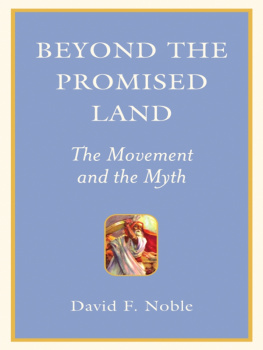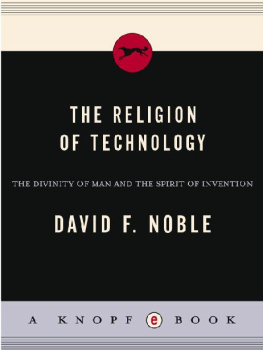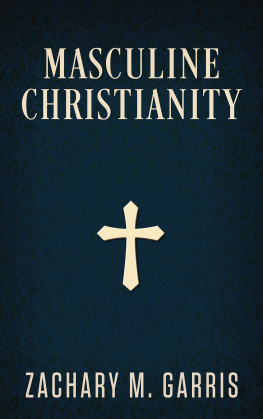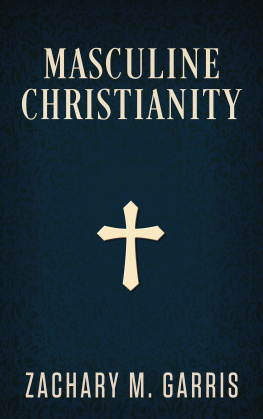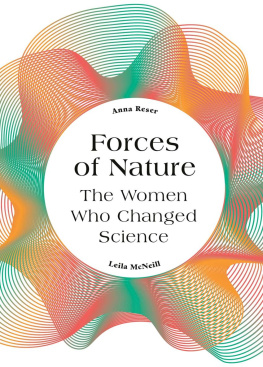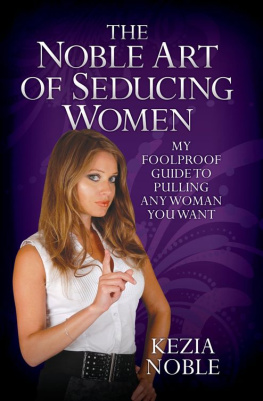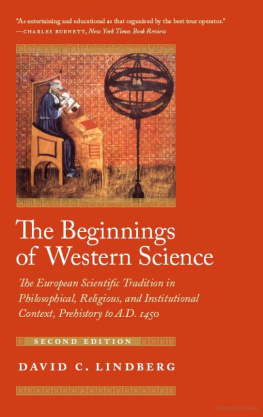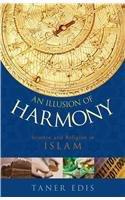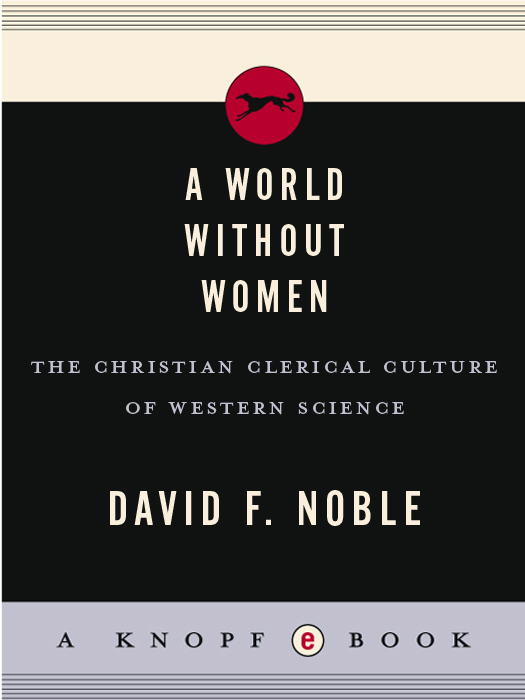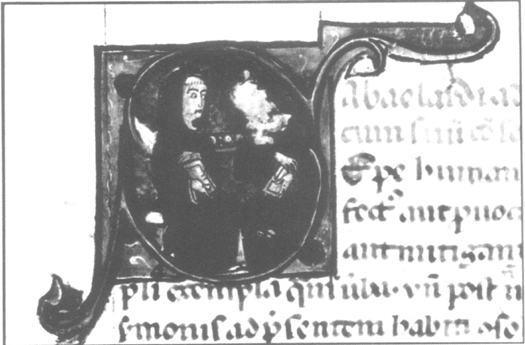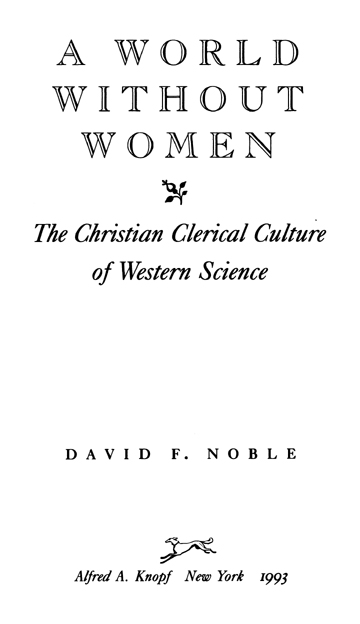Also by David F. Noble
AMERICA BY DESIGN
FORCES OF PRODUCTION
THIS IS A BORZOI BOOK
PUBLISHED BY ALFRED A. KNOPF, INC.
Copyright 1992 by David F. Noble
All rights reserved under International and Pan-American
Copyright Conventions. Published in the United States by Alfred A. Knopf, Inc., New York, and simultaneously in Canada by Random House of Canada Limited, Toronto. Distributed by Random House, Inc., New York.
Owing to limitations of space, all acknowledgments of permission to reprint previously published material may be found following the index.
Library of Congress Cataloging-in-Publication Data
Noble, David F.
A world without women: the clerical culture of Western science / by David F. Noble.
p. cm.
eISBN: 978-0-307-82852-1
1. Women in scienceEuropeHistory. 2. ScienceEuropeHistory. I. Title.
Q130.N63 1992
306.45082dc20 91-23073
v3.1
For Mary Ann
and our daughters,
Clare, Helen, and Alice
At the Resurrection, sex will be abolished
and nature made one. There will then be
only man, as if he had never sinned.
JOHANNES SCOTUS ERIGENA
Contents
PART ONE
A World with Women
PART TWO
A World Without Women
PART THREE
Science
Acknowledgments
A World Without Women is the first part of a larger inquiry into the origins and implications of the masculine culture of Western science and technology. (A second volume on the development of modern technology, The Masculine Millennium, is under way.) I began to think about such an undertaking in 1975, at the insistent urging of sociologist Sally Hacker, with whom I shared an office at MIT. Hackers pioneering efforts to penetrate the masculine mystique of engineering forced me for the first time to confront the gender dimension in science and technology, a belated and at the time still rather dim insight reflected merely in a footnote in my own book on the history of engineering. My subsequent study of the history of industrial automation convinced me of the need to explore the underlying compulsions of the male engineering culture, but here too the matter, which I still found unwieldy and elusive, gained only a footnote, albeit a somewhat longer one. I thereafter resolved to concentrate my efforts on this difficult but crucial subject.
In the meantime, of course, others well in advance of me have been pointing the way. This study could not even have been imagined without the path-breaking work of a generation of feminist scholars who cast a new light on the whole of Western history. I am especially indebted to those feminist students of science and technology who, like Sally Hacker, welcomed me into their ranks and encouraged my efforts, among them Cynthia Cockburn, Ursula Franklin, Sandra Harding, Evelyn Fox Keller, and Autumn Stanley. In researching and writing this study, I benefited from the support of the Library of Congress, Drexel University, the American Council of Learned Societies, and Mary and Stan Weir. I also want to thank Mike Cooley, David Dickson, Thomas Ferguson, Paul Forman, Michaelangelo de Maria, Leonard Minsky, and Douglas Noble for their advice and encouragement, and in particular Edward Reed, who shared with me his knowledge of the history of modern science and carefully reviewed the entire manuscript. I owe a great debt to historian George Ovitt, a patient and generous guide into the mysteries of the Middle Ages and the somber world of the Latin Church. This study could not have been done without his help and friendship. Nor could it have been done without the companionship of that other lapsed Catholic and abortion-rights activist Mary Ann OConnor. With an intelligence enriched by a spirit of defiance, she helped me grasp the full significance of the masculine culture of the church. And into my arid reflections upon that womanless world, she cast three daughters.
Introduction
W ESTERN SCIENCE EVOLVED only half human, in a world without women. As philosopher Sandra Harding has noted, women have been more systematically excluded from doing serious science than from performing any other social activity except, perhaps, frontline warfare. Heralded time and again as a heroic break from a more primitive past, the scientific enterprise nevertheless bore within it the enduring and deforming scars of a more ancient rupture, in the relations between the sexes. The scars are visible still.
I recall very vividly my first day in class, mathematician Marian Boyken Pour-El told a 1973 New York Academy of Sciences conference on women in science. Three seats in front of me, three seats in back of me, and two seats on either side were left vacant. I was a complete pariah in that social setting [the graduate school of Harvard University]. The men were positively unable to interact with me. Physicist Betsy Acker-Johnson recalled that she was viewed as a weirdo because I was a woman studying, of all things, experimental physics. Joanne Simpson remembered that her professor, the greatest living meteorologist, was a model to me whose creativity, expansiveness, and ability to inspire people I am still seeking to emulate. He had no use for women in meteorology, however.
I was not prepared for the discovery that women were not welcome in science, that their presence would be viewed as an outrageous violation of the social order and against all the laws of nature, experimental psychologist Naomi Weisstein explained in a later forum. We were shut out we were shown we didnt belong. I was completely isolated. I did not have access to the normal channels of communication, debate, and exchange in the professionthose informal networks where you get the news, the comment, the criticism, the latest reports of what is going on. I had been exiled [from] the inner reaches of the profession. Mathematical biologist Evelyn Fox Keller likewise recounted her initial estrangement from the culture of science and the classroom sea of seats which surrounded
This book examines the evolution of this anthropologically curious culture of science, which has somehow come to appear so normal. Though there have been notable recent efforts to recruit women into so-called traditionally masculine scientific fields, there has been noticeably little reflection about how these fields became masculine in the first placeand with what significance. In recent years, there have been important pioneering attempts to understand the nature and origins of this masculine scientific tradition, such as in the work of Carolyn Merchant, Brian Easlea, Evelyn Fox Keller, Sandra Harding, and Londa Schiebinger, but for the most part the exclusive identification of science with men has been taken as a given, something to be overcome, perhaps, but never really explained. Yet any genuine concern about the implications of such a culturally distorted science-based civilization, or about the role of women within it, demands an explanation. For the male identity of science is no mere artifact of sexist history; throughout most of its evolution, the culture of science has not simply excluded women, it has been defined in defiance of women and in their absence. Thus, predictably, the world of science has remained an alien world for women, and a hostile one, a world where women are not merely marginalized but anathematized, where they face not just discrimination but dread. How did so strange a scientific culture emerge, one that proclaimed so boldly the power of the species while at the same time shrinking in such horror from half that species? This is the question before us.


